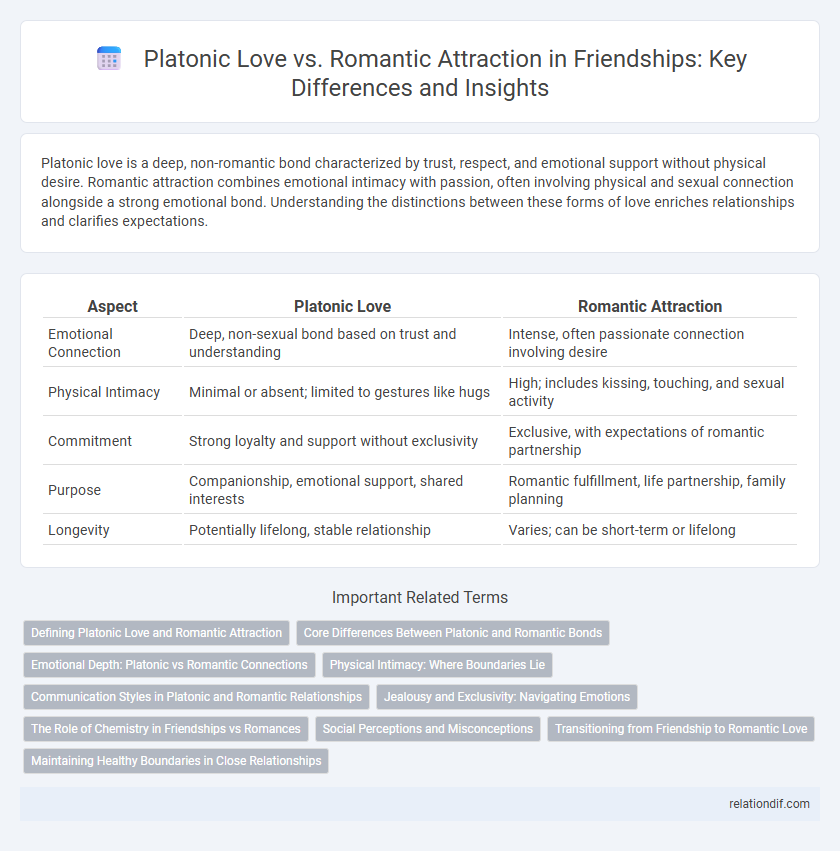Platonic love is a deep, non-romantic bond characterized by trust, respect, and emotional support without physical desire. Romantic attraction combines emotional intimacy with passion, often involving physical and sexual connection alongside a strong emotional bond. Understanding the distinctions between these forms of love enriches relationships and clarifies expectations.
Table of Comparison
| Aspect | Platonic Love | Romantic Attraction |
|---|---|---|
| Emotional Connection | Deep, non-sexual bond based on trust and understanding | Intense, often passionate connection involving desire |
| Physical Intimacy | Minimal or absent; limited to gestures like hugs | High; includes kissing, touching, and sexual activity |
| Commitment | Strong loyalty and support without exclusivity | Exclusive, with expectations of romantic partnership |
| Purpose | Companionship, emotional support, shared interests | Romantic fulfillment, life partnership, family planning |
| Longevity | Potentially lifelong, stable relationship | Varies; can be short-term or lifelong |
Defining Platonic Love and Romantic Attraction
Platonic love centers on deep emotional connection and mutual respect without sexual desire, emphasizing trust and shared values. Romantic attraction involves a combination of emotional intimacy and physical desire, often accompanied by longing for a romantic partnership or commitment. Understanding the distinction between platonic love and romantic attraction helps clarify intentions and strengthen various interpersonal relationships.
Core Differences Between Platonic and Romantic Bonds
Platonic love is characterized by deep, non-sexual emotional connection and mutual respect without physical desire, emphasizing trust and companionship over intimacy. Romantic attraction involves both emotional and physical desire, often including passionate affection and the aspiration for a committed partnership. Core differences between platonic and romantic bonds lie in their intentions: platonic relationships prioritize emotional closeness without romantic expectations, while romantic bonds integrate physical attraction and long-term emotional investment.
Emotional Depth: Platonic vs Romantic Connections
Platonic love is characterized by deep emotional intimacy without sexual or romantic desire, fostering trust, loyalty, and mutual understanding. Romantic attraction involves a combination of emotional depth and physical affection, often intensifying feelings of passion and exclusivity. Both connections offer profound emotional fulfillment but differ in the nature of attachment and the expression of care.
Physical Intimacy: Where Boundaries Lie
Platonic love centers on deep emotional connection without physical intimacy, emphasizing trust, respect, and emotional support as core boundaries. Romantic attraction often includes a desire for physical closeness, such as hugging, kissing, or more, which can complicate or blur the lines in friendships. Clear communication about comfort levels and personal boundaries is essential to maintain the integrity of platonic relationships while navigating the potential for romantic feelings.
Communication Styles in Platonic and Romantic Relationships
Platonic love emphasizes open, honest communication that fosters trust and emotional support without romantic expectations, often prioritizing active listening and mutual understanding. Romantic attraction typically involves expressions of passion and vulnerability, with communication styles that include verbal affirmations, physical touch, and deeper explorations of future intimacy. Understanding these distinct communication patterns enhances relationship dynamics by aligning emotional needs in both platonic and romantic contexts.
Jealousy and Exclusivity: Navigating Emotions
Jealousy in platonic love often arises from a desire for exclusive emotional connection without physical intimacy, contrasting with romantic attraction where jealousy can be tied to both emotional and physical exclusivity. Managing these emotions requires clear communication about boundaries and expectations to prevent misunderstandings in friendships and romantic relationships alike. Understanding that platonic relationships thrive on trust and shared experiences, while romantic connections may involve deeper passion and possessiveness, helps navigate feelings of jealousy effectively.
The Role of Chemistry in Friendships vs Romances
Chemistry in friendships often centers on shared interests, mutual respect, and emotional support, fostering a deep platonic bond without physical desire. In romantic attraction, chemistry combines emotional connection with physical and sexual desire, amplifying intimacy and passion. While both relationships thrive on trust and communication, the nature of chemistry distinctly shapes the dynamics and expectations between friends and romantic partners.
Social Perceptions and Misconceptions
Platonic love is often misunderstood as lacking depth compared to romantic attraction, yet it represents a profound emotional bond without sexual desire. Social perceptions frequently blur the boundaries, leading to misconceptions that friendships with emotional intimacy inevitably evolve into romance. Research highlights that healthy platonic relationships contribute significantly to emotional well-being and social support, challenging the stereotype that all close connections must be romantic.
Transitioning from Friendship to Romantic Love
The transition from friendship to romantic love often involves a deepening emotional connection marked by heightened intimacy and attraction beyond platonic boundaries. Research indicates that couples who begin as friends frequently experience stronger communication and trust, providing a solid foundation for romantic relationships. Navigating this shift requires mutual honesty and emotional vulnerability to maintain the integrity of the original friendship while exploring new romantic dynamics.
Maintaining Healthy Boundaries in Close Relationships
Maintaining healthy boundaries in close relationships requires clear communication and mutual respect to differentiate between platonic love and romantic attraction. Setting limits around physical touch, emotional sharing, and personal space helps prevent misunderstandings and preserves trust. Regular reflection on feelings and intentions ensures that both parties feel safe and valued, supporting a balanced and enduring friendship.
Platonic love vs Romantic attraction Infographic

 relationdif.com
relationdif.com